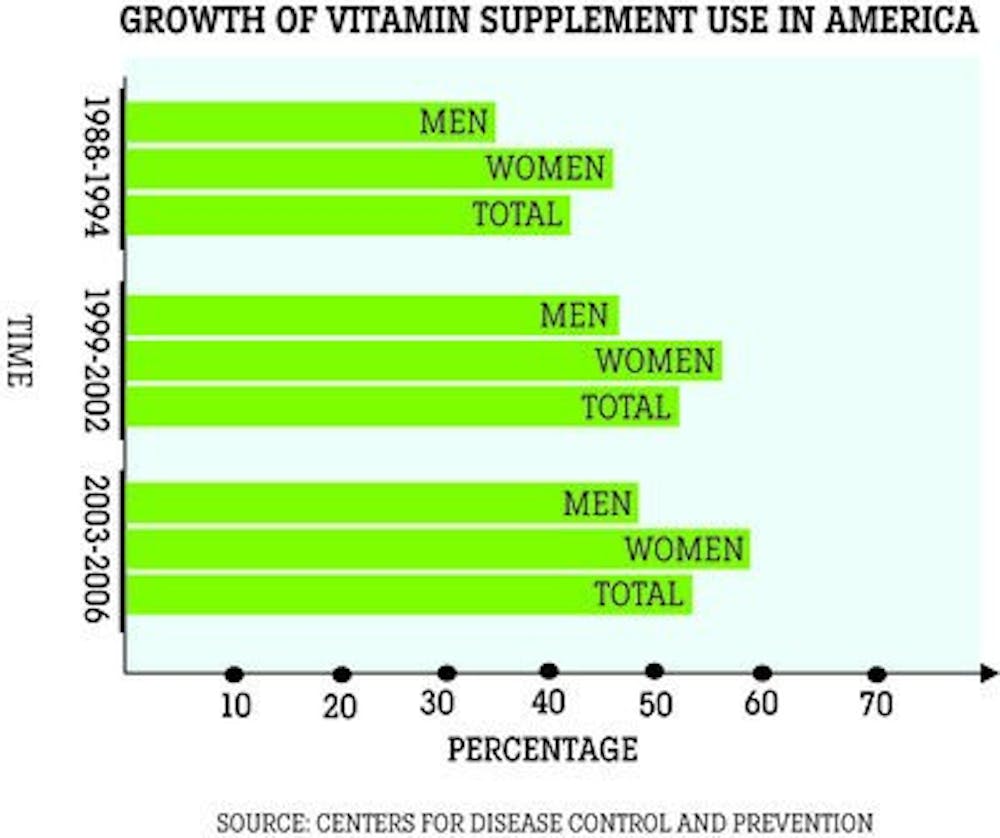Since December 2013, the media have been buzzing over multivitamins and questioning the belief that they can prevent future diseases. Vitamin supplements are being touted as harmful and a waste of money.
Auburn University specialists examined the studies to help shed some light on these dramatic claims.
"My belief is that vitamins can be beneficial and harmful, depending on who's taking them, what their food intake is, [and] especially how that food actually rates in the quality and quantity of vitamins and minerals," said Jessica-Lauren Newby, registered dietitian at Auburn's Recreation and Wellness Center.
Newby said that women of childbearing age, women who are pregnant and the elderly could benefit from certain vitamins.
For example, people who avoid dairy products for fear of fat and calories could have compromised their calcium intake and would profit with supplementing calcium.
Those at risk include people who are over-supplementing, as certain combinations of vitamins have negative interactions.
A few vitamins have the potential to reach a level of toxicity, Newby said, but the most commonly supplemented--Vitamins B12 and D--do not. Newby also said Vitamin C could be detrimental if too little or too much was taken.
After investigating numerous articles, Newby said, "We do better to get our vitamins and minerals through food always, but where there are gaps in the diet, a vitamin can be sometimes helpful for bridging the gap."
She pointed out that vitamins occur in food sources that have other components that aid in absorbing the vitamins.
Vitamin D is a naturally occurring nutrient that can only be absorbed in the presence of fat, so adding fat-free dressing or drinking skim milk is actually inhibiting a healthy diet.
"You are consuming these foods that are actually high in vitamins and minerals, but you aren't absorbing them to their full potential because that fat isn't present to take them into your cells," Newby said.
Blood work with a physician followed by a dietary intake with a nutritionist can show those curious about their vitamin regimen where their food choices have fallen short. Newby cites this as a good preventative measure to fighting vitamin deficiencies.
Richard Davis, a PhD student in Pharmacy concentrating in drug development and discovery, referred to a five-year study conducted at Oxford University.
In 2002, researchers began administering vitamins to adults with pre-existing cardiac, respiratory and neuropsychiatric conditions.
At first, vitamin supplements showed small statistical improvements among participants. However, at the end of the study, their conditions had not improved, but had not worsened either.
"Something that you always have to address when you take a vitamin if you go to look at any website or you read the back of any label: 'Discuss with your physician before starting a really heavy regiment,'" Davis said.
He explained that multivitamins are not typically dangerous, but supplements may adversely affect the potency of other medications.
"If you take a stimulant like Adderall, for instance, and you take Vitamin C before you take that medicine, it may decrease the ability of the medicine to absorb in your intestines after you take it, because it changes the acidity of your body very slightly," Davis said.
For Davis, unless there is a deficiency of a particular vitamin, taking a multivitamin is up to the individual, as there seems to be very little risk involved. However, the scientific community is continually researching the subject.
Davis admits that there is still more to discover.
"These papers are constantly assessed," Davis said. "The science of it is always changing and it may be a question that we never really find the answer for."
Dr. Suresh Mathews, Graduate Program Director in the Department of Nutrition, Dietetics, & Hospitality Management, examined an article published in the Annals of Internal Medicine in December titled "Enough is Enough: Stop Wasting Money on Vitamin and Mineral Supplements."
The article addresses a study conducted by the U.S. Preventative Services Task Force.
"Based on the systematic review that they did, their findings indicate that if you're well-nourished, then getting these multivitamin supplements really don't add any further benefit in the prevention of chronic diseases," Mathews said.
Beta-carotene, Vitamin E and possibly high doses of Vitamin A could be harmful if taken separate from a multivitamin, he said.
Like Newby and Davis, Mathews said he believes certain populations may have vitamin deficiencies, which are aided by specific supplements. He mentioned that mega-doses of a multivitamin are commonly sold to cardiac patients to help lower triglycerides and that wheat products are now enriched with Folate, which is preventative against birth defects.
Mathews described the best way to add vitamins to your diet: "What we teach in nutrition is Variety, Balance and Moderation. These three are the founding principles of nutrition."
If your meal plan involves a rainbow of food, lots of whole grains and protein, you most likely will not need to supplement with any vitamins, Mathews said.
Do you like this story? The Plainsman doesn't accept money from tuition or student fees, and we don't charge a subscription fee. But you can donate to support The Plainsman.





